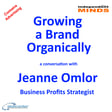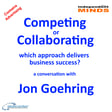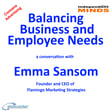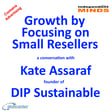
Serenity in Leadership – a conversation with Thom Dennis
Leadership the calm, peaceful and untroubled way creating time to absorb a situation and think.
Thom Dennis is a former Royal Marines officer who became a cultural change consultant and executive coach.
Thom developed Serenity in Leadership, an approach to leadership that aims to provide leaders with a greater understanding of themselves and free them from the constraints of conventional approaches so they can lead in a more authentic and engaging way.
In an episode of The Independent Minds recorded during the reign of Queen Elizabeth II of the United Kingdom, Thom and host Michael Millward explore Serenity in Leadership. Their conversation covers
- The feminine and masculine aspects of leadership
- Conventional expectations of leaders
- The importance of self-awareness for leaders
- How, regardless of our gender, we all have feminine and masculine aspects to our personalities
- How attempts to achieve serenity are impacted by these two sides of our personality
- How these different aspects of our personality impact the way women are treated by men.
- The challenges woman face when leading at work.
- Challenges of leading home workers
More information about Thom Dennis and Michael Millward is available at abeceder.
Audience Offers – listings include links that may create a small commission for The Independent Minds
The Independent Minds is made on Zencastr, because as the all-in-one podcasting platform, Zencastr really does make creating content so easy.
If you would like to try podcasting using Zencastr visit zencastr.com/pricing.
Travel
With discounted membership of the Ultimate Travel Club, you can travel anywhere at trade prices on flights, hotels, trains, and many more travel related purchases.
Fit For Work We recommend The Annual Health Test from York Test; a 39-health marker Annual Health Test conducted by an experienced phlebotomist with hospital standard tests carried out in a UKAS-accredited and CQC-compliant laboratory.
A secure Personal Wellness Hub provides easy-to-understand results and lifestyle guidance
Visit York Test and use this discount code MIND25.
Visit Three for information about business and personal telecom solutions from Three, and the special offers available when you quote my referral code WPFNUQHU.
Being a Guest
We recommend the podcasting guest training programmes available from Work Place Learning Centre.
We use Matchmaker.fm to connect with potential guests If you are a podcaster looking for interesting guests or if you have something interesting to say Matchmaker.fm is where great guests and great hosts are matched and great podcasts are hatched. Use our offer code MILW10 for a discount on membership.
We appreciate every like, download, and subscriber.
Thank you for listening.



















